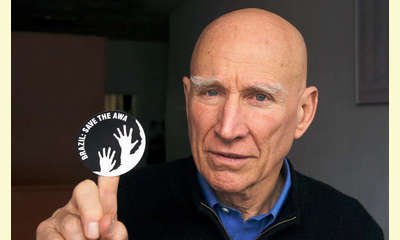|
|
A year of successes: Tribal peoples’ reasons to celebrate in 2013
an article by Survival International
As the year draws to a close, Survival
International’s new photographic gallery illustrates
how tribal peoples around the world had reasons to
celebrate in 2013.

World-renowned Brazilian photographer Sebastião Salgado documented the plight of the Awá, Earth's most threatened tribe. © Survival
click on photo to enlarge
From the suspension of mining concessions in
Colombia to the Dongria Kondh’s unanimous rejection
of a bauxite mine in India, tribal peoples have
gained some important victories in 2013 in the
struggle for their rights:
- In Brazil, a community of Guarani Indians
celebrated after the government recognized their land as indigenous
and for their exclusive use. The Guarani have lost
most of their land to cattle ranchers, soya and
sugar cane plantations and their leaders are
routinely assassinated.
- The shocking story of the Awá, known as Earth’s
most threatened tribe because their forest is
being logged at an alarming rate, reached millions
of people worldwide after images of the Awá by
renowned photographer Sebastião Salgado appeared
alongside features in Vanity Fair and Sunday Times
magazine. Since the launch of Survival’s Awá
campaign, over 55,000 protest emails have reached
Brazil’s Minister of Justice urging him to evict
illegal invaders on their land.
- Survival’s call for a boycott of Botswana
tourism resulted in three travel companies suspending their tours to Botswana
over the mistreatment of Africa’s last
hunting Bushmen. While promoting tourism to
Botswana with glossy images of the tribe, the
government is driving the Bushmen off their
ancestral land and prevents them from hunting.
- In India, tribal people made their voices heard
after the Supreme Court ordered unprecedented
community consultations with the Dongria Kondh
over an open-pit bauxite mine on their land. All
villages overwhelmingly rejected plans by
the British mining giant Vedanta Resources in
their sacred Niyamgiri Hills.
- And the new ‘Proud Not
Primitive’ campaign in India – which
challenges the deep-seated prejudice that tribal
peoples are ‘backwards’ and ‘primitive’ – celebrated an important victory
after the Hindu, one of the largest English-
language newspapers, pledged not to call tribes
‘primitive’.
Nixiwaka Yawanawá, an Amazon Indian who joined
Survival in 2013 to speak out for indigenous rights, said,
‘Tribal people have made their voices heard in
2013, but they continue to face oppression. In
2014 the world’s eyes will be on Brazil for the
FIFA World Cup – a good opportunity for us to show
the international community the struggle for our
land. I hope that the Brazilian government will
take the lead in respecting indigenous rights to
lands, and others will follow suit.’
Survival’s Director Stephen Corry said today,
‘This selection of a few successes for tribal
peoples in 2013 is typical of so much of
Survival’s work. Our first priority is to stop
the violation of tribal peoples’ most fundamental
human rights. Then we have to change public
opinion around the world, so that governments and
companies cannot get away with atrocities. It is
slow, unglamorous, and often invisible work, but
over 40 years of working with tribal peoples have
proven it is the most meaningful and effective
means for long-term change.’
|








|
DISCUSSION
Question(s) related to this article:
The rights of indigenous peoples, how can they be protected?
* * * * *
Latest reader comment:
If readers of CPNN are not already familiar with the website of the organization Movement for Tribal Peoples, the above article is a good reason to discover the site. It is not only well laid out and presented, but also does a good job of covering stories concerning the survival of indigenous peoples.
Their annual report for 2012 is on line here.

|
|









